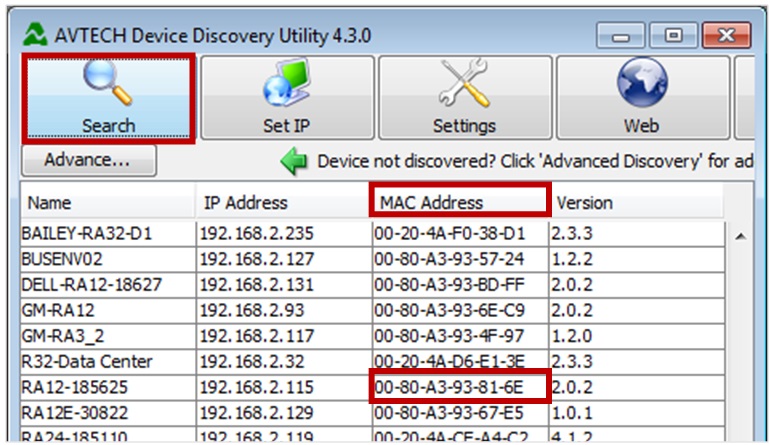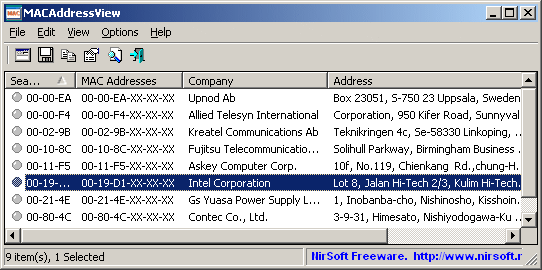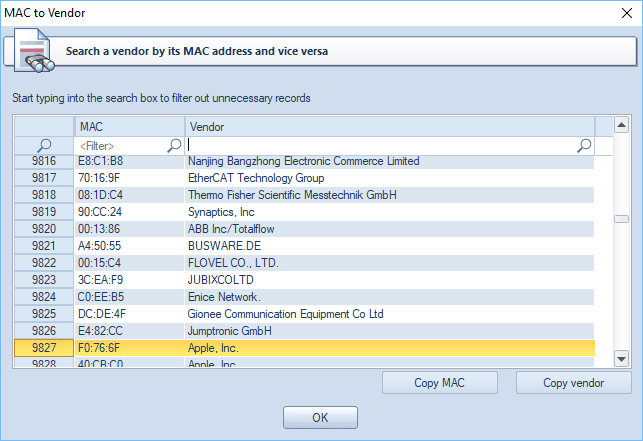PCI-Z is a freeware lightweight system utility designed to provide information about (unknown) PCI (PCI-E, PCI-X...) devices and helps you find appropriate device drivers. Download now
The first 48 bit of the media access control (MAC) address of your network device incorporate the vendor's unique 'Organizationally Unique Identifier' (OUI). If you provide the leading 6 digits of your network devices MAC we will lookup the vendor for you, and you can even do a reverse search: wildcard search all matching vendor names. Companies that assign all 16.8 million possible values can obtain more OUIs. Nmap-mac-prefixes maps each assigned OUI to the name of the vendor that sells them. Example 14.6 is a typical excerpt. Excerpt from nmap-mac-prefixes. 006017 Tokimec 006018 Stellar ONE 006019 Roche Diagnostics 00601A Keithley Instruments 00601B Mesa. Oracle Database 19c is the current long term release, and it provides the highest level of release stability and longest time-frame for support and bug fixes. Oracle Database 21c, also available for production use today as an innovation release, provides an early insight into the many enhancements and new capabilities. Download: MAC address and vendors CSV database. MAC Vendor Database CSV Unique MAC address: 43922 Updated: 28 September 2021. Download CSV database ( 2.3MB). MAC Address Batch Upload. Upload a file that contains a list of MAC Addresses separated by anything (new line, comma, space, etc).
PCI-Z is a freeware lightweight system utility designed to provide information about (unknown) PCI (PCI-E, PCI-X...) devices and helps you find appropriate device drivers.
PCI-Z is designed for detecting unknown hardware on your Windows based PC. It will help you determine vendor, device and certain details about device even if you don't have drivers installed. Software uses The PCI ID Repository, a public repository of all known ID's used in PCI devices: ID's of vendors, devices, subsystems and device classes. It is used in various programs (e.g. The PCI Utilities) to display full human-readable names instead of cryptic numeric codes. It is almost similar to lspci Linux command but with full Windows support.
You can find drivers for your operating system without a problem! Find drivers for your WiFi cards, audio cards, network cards or any other PCI peripheral.
PCI-Z 2.0 is compatible and works on: Windows XP SP3Windows VistaWindows 7Windows 8Windows 10Windows Server 2003 R2Windows Server 2008/2012/2016 (R2)Windows PE
For legacy purposes, you can use PCI-Z 1.31 on (in addition to OS'es listed above): Windows 2000Windows NeptuneWindows XPWindows LonghornWindows Server 2000/2003Bart PE/ReatogoReactOS
Both 32 bit (x86) and 64 bit (x64) Windows versions are fully supported, where applicable. Both i386 and amd64 kernels of Windows PE are supported as well. PCI-Z 1.31 also works on Bart PE/Reatogo, 'live CD' of Windows XP. In addition, you can run PCI-Z on ReactOS in full functionality. ReactOS is a free open source operating system based on the best design principles found in the Windows NT architecture - providing completely and in all ways legal and free platform for running PCI-Z without any Windows licenses necessary. PCI-Z will NOT run on Windows 95, 98 or ME.
It does not require any library but default Windows ones. No Visual Studio C++ redistributed, no .NET platform, no Java. WMI (Windows Management Instrumentation) is required from PCI-Z 2.0 for motherboard and BIOS version detection..
There is no installation or configuration! Simply run the file and wait until you get the report. Afterwards, right click on the line to get options (copy all data or just a segment) or export the whole list.
The author of CPU-Z has granted me permission to use a name similar to his product. Thanks Franck!
Key features
- detects all PCI/PCI-X/PCI-E cards, even if your device manager doesn't recognizes them
- one file only needed for running - 100% portable, no installation needed, no Internet connection needed (except for automatic database update)(
- 'lspci for Windows' - familiar lspci-like tool from Linux in both GUI and CLI form on Windows
- helps you find drivers for your unknown PCI devices on Windows
- reports devices with drivers issues
- daily updates with PCI ID database
- small size, small memory footprint
- spyware/malware free
How to use
Although PCI-Z is very simple to use, there are some considerations to be taken into account.
Verify From PCI-Z 2.0 there is an option to verify your PCI configuration and share it online. This way, you can help others find out if their hardware is compatible on certain combination of motherboards, BIOS'es and operating systems. Verification and access to online database is completely free! You can check out PCI-Z online database below

PCI-Z has embedded PCI ID database for redundancy and ability to work in the strict and closed environments. However, there are several options to load (not necessarily, but usually) newer PCI ID databases. When starting, PCI-Z checks current folder for 'pci.ids' of newer date. If there is newer PCI ID database in current folder, PCI-Z will automatically use it instead of embedded one. You can either use Update to check if there is newer pci.ids database online, or Load one manually from your PC. In case there have been changes in your PCI configuration, you can pick Refresh to reload database and rescan PCI devices.
PCI-Z has the ability to take screenshot of itself by clicking on Screenshot. Screenshot will be taken as 24 bit PNG.
Apple Database
You can export your PCI configuration in plain text, CSV or JSON by clicking on Export
By right clicking on listed device, there is an option for drivers search - Search for drivers. That option will run a simple Google query in your default Internet browser with vendor name and your operating system version. This does not guarantee that you will find your driver, nor am I responsible for any potential damage!
Up to version 1.31, PCI-Z has embedded both CLI and GUI versions of PCI-Z in one file. That will result in loading both GUI and 'blank' console (CLI) window once you start PCI-Z. Except for the visual effect (console window should generally disappear momentarily) that all users are not accustomed to, GUI functionalities of PCI-Z have remained the same. PCI-Z has command line options for advanced users. Details about those can be accessed by running PCI-Z from console (CLI) with '/?' switch/parameter. These options are no longer available on PCI-Z 2.0 and up. However, previous version will provide basic features of PCI-Z and support for legacy systems.
Verification database
From PCI-Z 2.0 there is an option to verify your PCI configuration and share it online. This way, you can help others find out if their hardware is compatible on certain combination of motherboards, BIOS'es and operating systems. Verification and access to online database is completely free.
Screenshots
Download
All regular users can use 'normal' (x86) version of PCI-Z. For users that are using Windows PE or any other Windows version supporting exclusively amd64 kernel, you can use x64 version. Both versions have exactly the same functionalities!
Mac Id To Vendor


Download PCI-Z 2.0 (1.145 kB) (PCI ID version 2017.07.01) [SHA1: 4f4543047ad941945225ace697beb13ceb015e7b]
Download PCI-Z x64 2.0 (1.420 kB) (PCI ID version 2017.07.01) [SHA1: b7f3084e77c5629e84d660f0e4f9021374be4c3b] (yes, still fits on single '1.44 MB' floppy!)
What's new (Release Notes)- 2.0 (Jul 15, 2017)
- Significant code changes and speedups, improved pci.ids database handling
- Support for online verification!
- Verbose PCI device status
- Various other code improvements
- 1.31 (Jul 15, 2017)
- Fixed major bug with detecting multiple identical devices; update for legacy support
- 1.3 (Apr 19, 2014)
- Significant code changes and speedups
- All database transactions are dealt with through memory
- 'Error message' column no longer appears if there is no errors/problems with devices
- Added devices class detection
- Added ability to sort columns
- Fixed bug where part of menu was left when screenshot was taken
- CLI output is now more lspci-like
- 1.2 (Jan 27, 2014)
- Command line options
- Screenshot ability
- E-mail report
- Better PCI ID database manipulation and redundancy
- Automatic search for driver (requires browser and Internet connection)
- Bug fixes and code improvements
- 1.0.1.0 (Jan 4, 2014)
- Can display basic system information
- Ability to load newer database from PCI ID manually
- Resize to arbitrary window size
- Minor code improvements
- 1.0.0.2 (Sep 9, 2013)
- Added main menu and help file
- 1.0.0.1 (Sep 9, 2013)
- Added maximize screen capability
- Minor bug fixes
- 1.0.0.0 (Sep 6, 2013)
- Initial version


Download PCI-Z 1.31 (685 kB) (PCI ID version 2017.07.01) [SHA1: 3c97fec72d46243abc0ac4c7bfb27ed2d66eed14]
Download PCI-Z x64 1.31 (830 kB) (PCI ID version 2017.07.01) [SHA1: 88aa11b31b6d9cb07130ee0feff4cb32622878e0]
Please report all bugs and comments to bubba (at) pci - z (dot) com
Mac2vendor
Software is free for both commercial and non commercial usage. You can review licence here.
| Your IP Address is Not Available |
| Alert! You Are Using a Limited Version of WhatsMyIP.org |
Your Browser Is Not Supported Your web browser is too old to view this website! This website uses HTML5-compliant code, with lots of JavaScript and CSS to bring you a very modern web experience. However your web browser is too old to support these modern web standards. If your computer can support it, you should upgrade to a modern web browser. If your computer is extremely old, just sit back and enjoy one of the last web pages on the internet that supports you. We have a small subset of tools on this obsolete page for you to use. No new tools will be added. Ignore the Problem You may choose to ignore this message and proceed to the main website. But please be aware that the site will not work properly. It will most likely fail catastrophically in your browser. Upgrade Your Browser If your computer supports it, you should upgrade your browser. Especially if you are using Internet Explorer. Below are links to the most popular, well-maintained, current web browsers available.
|
| ©1985 | | |